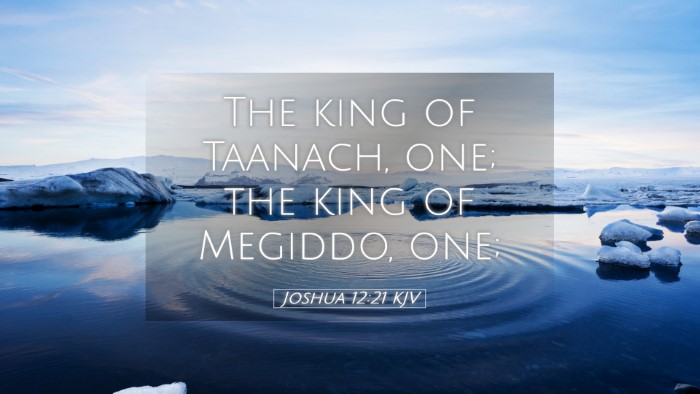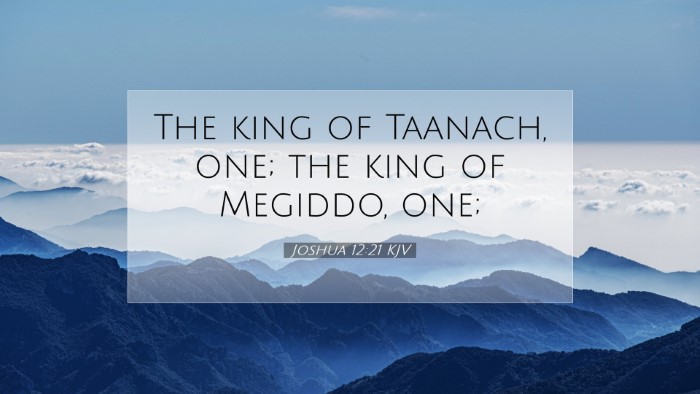Bible Commentary on Joshua 12:21
Joshua 12:21 states: "The king of Jachanan, one; the king of Dor in the coast of Dor, one; the king of the nations which are in the mountains, one;"
This verse is part of a larger passage that enumerates the kings defeated by the Israelites during their conquest of Canaan. This victory marked significant progress in God’s promise to the Israelites, affirming divine intervention and faithfulness.
Summary of Insights from Public Domain Commentaries
1. Matthew Henry's Commentary
Matthew Henry highlights the systematic record of the defeated kings, suggesting that documentation of these events serves a dual purpose: the glorification of God’s power and the encouragement of His people. Henry stresses the fulfillment of God's promise to Israel and God's enablement of His people to overcome formidable foes. He notes:
- God's Sustained Promise: The listing of these kings serves to display God's faithfulness in delivering parts of the promised land to Israel. Each king's defeat emphasizes God’s overarching control over history.
- Assurance for Future Generations: By preserving the record of these victories, future generations could find faith in God’s promises and validation of their heritage as conquerors by divine appointment.
2. Albert Barnes’ Commentary
Albert Barnes provides a detailed analysis of the geographical context of the region conquered. This commentary underscores the strategic importance of both Jachanan and Dor. Barnes notes:
- Cultural and Political Significance: Both Jachanan and Dor were not just geographic locations; they held significant influence in the surrounding areas, with Dor being more notable due to its position on the Mediterranean coast.
- Theological Reflection: Barnes emphasizes the theological implications of military victories. The conquest of these kings underscores the idea that the Israelite victories were not merely military triumphs but manifestations of God’s will over earthly kingdoms.
3. Adam Clarke's Commentary
Adam Clarke approaches the text by delving into historical interpretations and the translation of names mentioned. Clarke offers a thoughtful exploration of the king of Jachanan, asserting:
- Understanding Names and Places: Clarke provides insight into the meanings behind the names of the kings and cities, unraveling historical significance while providing context for the struggles faced by the Israelites.
- Implications of Conquest: He emphasizes that the references to defeated kings are more than record-keeping; they serve to bolster the morale of the Israelites. By recalling God's past acts of deliverance, Israel was reminded that these victories were proof of God’s sustaining power.
The Importance of Remembering
The common thread among these commentaries illustrates a vital principle: the importance of remembrance. The act of recording the defeat of these kings serves as a testament to the faithfulness of God. It was essential for Israel to remember these victories as part of their covenant history. Each king represents an enemy of faith that had been conquered and becomes a staple of God's deliverance narrative.
Theological Implications
The verses surrounding Joshua 12:21 not only document history but build a foundational understanding of Israel's relationship with God. The territory conquered symbolizes not just land but the spiritual dominion God has over nations and kingdoms.
- Divine Sovereignty: The victories recorded indicate God's sovereign rule over nations; the battles fought signify a struggle for not only land but also for spiritual authority.
- Faithfulness of God: Each king's defeat showcases God's unwavering commitment to Israel. The historical context reinforces trust in God's ongoing plans for His people.
Application for Today
This passage resonates with contemporary readers, especially for pastors, theologians, and scholars. There are profound lessons to be learned regarding faith, remembrance, and the acknowledgement of divine sovereignty in our lives:
- Encouragement in Trials: Just as Israel faced formidable kings with the assurance of God’s presence, today’s believers are reminded to stand firm with the awareness that God fights on their behalf.
- Historical Reflection: The act of remembering God’s past faithfulness can encourage believers to trust Him for future challenges.
- Community of Believers: This passage invites communal reflection among churches regarding shared histories of God’s provision and victories.
Conclusion
Joshua 12:21 encapsulates a vital narrative of God’s faithfulness through recounting historical victories. The insights from Henry, Barnes, and Clarke not only illuminate the text for contemporary application but serve to bolster the faith of those who read it. As we reflect on these passages, may we be empowered to remember and to trust in God's sovereignty over all that challenges us.


